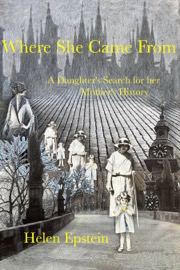 paperback $19.20; eBook $9.99 on Kindle
paperback $19.20; eBook $9.99 on KindleWhere She Came From: A Daughter’s Search for Her Mother’s History by Helen Epstein (106,000 words, 45 illustrations)
A sequel to the groundbreaking Children of the Holocaust, Where She Came From is a daughter’s memoir of her mother’s family. Drawing on her journalistic training, Helen Epstein demonstrates how documentary research can unearth family history and bridge the historical chasm of the Shoah. This book is at once a memoir, a family history and a social history of Central European Jews of the 19th and 20th centuries. The three generations of women she portrays are dressmakers; the fashion salon, a refuge and a rare institution where women could speak.
“What we so coldly call ‘acculturation’ is a major theme of Helen Epstein’s rich and absorbing new book, Where She Came From. In the guise of a family memoir, she brilliantly evokes Jewish life in the Czech lands... Epstein is unsparing in her examination of the trials of transplantation, and unlike many family biographers, who are in thrall to their characters, she steps out of the frame to observe herself.” — Ruth Gay, New York Times Book Review
“With this family history, Epstein adds a vivid and telling chapter to the reconstruction of Jewish women’s history, one life at a time. The settings range from the Bohemian town of Brtnice; to the Belle Epoque Vienna of assimilated Jews; to newly independent and cosmopolitan Prague in the 1920s, where Pepi ran a fashion salon; to Auschwitz, Bergen-Belsen, and finally New York. It is a compelling account, one that any woman trying to recover her history will value.” — Kirkus Reviews
“In Epstein’s expert and sensitive hands, truth becomes not only stranger than fiction, but more magnetic, wise and powerful.” — Gloria Steinem
“Helen Epstein’s literary pilgrimage to her past will enrich our quest for memory and understanding. Written with her superb talent of storytelling, her tale is profoundly human.” — Elie Wiesel



